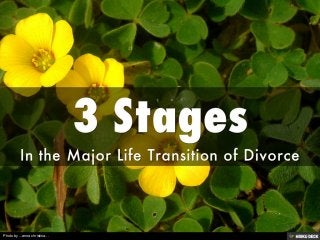3 Stages in the Major Life Transition of Divorce
When it comes to divorce, we can learn a great deal from what anthropologists have learned by looking at how indigenous societies handle major life transitions. First nations and indigenous groups see major life transitions as having three main stages: - 1. Death of an old identity - 2. A period of necessary disorientation - 3. Re-birth into a new identity Anthropologists note that primal societies see each of the three as necessary for "rites of passage" that initiate a person into a new identity in the aftermath of a major life transition. In the death or dying stage, the individual must take in what it really means for the old identity to be truly dead. This includes grieving the loss of the old identity. This is followed by a period of disorientation that is often mythologically characterized as "time journeying through the underworld, or the land of the dead." Not knowing the way forward is considered normal at this point in the journey, even essential. Finally there is the stage of re-birth, in which the individual must come to understand who they are now, and start to learn what it means to live out that new identity. In the case of divorce, it would mean doing the necessary soul work to create the foundation of a solid and complete post-divorce identity.

Recommended
More Related Content
More from Brian Collinson
More from Brian Collinson (20)
Recently uploaded
Recently uploaded (20)
3 Stages in the Major Life Transition of Divorce
- 1. Photo by ...anna christina...
- 2. Photo by Ecoagriculture Partners
- 3. Photo by Secretary of Defense
- 4. Photo by Shayan (USA)
- 6. Photo by Ken Lund
- 9. Inspired? Create your own Haiku Deck presentation on SlideShare! GET STARTED
